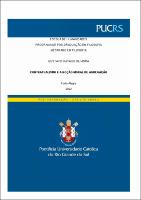| Share record |


|
Please use this identifier to cite or link to this item:
https://tede2.pucrs.br/tede2/handle/tede/10180| Document type: | Dissertação |
| Title: | Contratualismo e a noção moral de agregação |
| Author: | Oliveira, Gustavo Oliva de  |
| Advisor: | Weber, Thadeu |
| Abstract (native): | O tema desta dissertação é a relação entre contratualismo moral e a noção de agregação moral. A dissertação possui três objetivos principais. Em primeiro lugar, fornecer uma explicação detalhada da agregação moral e dos seus principais problemas. A principal objeção é a de que teorias agregativas são incapazes de fazer distinções morais relacionadas à separação normativa das pessoas. Em segundo lugar, oferecer uma teoria não-agregativa da moralidade, neste caso, o contratualismo moral, como solução para os problemas da agregação. O contratualismo é centrado na noção de justificação moral para cada pessoa, e por isso encontra sucesso nos casos em que a agregação falha. Por último, defender o contratualismo moral de críticas relacionadas à sua exclusão das cláusulas agregativas. Os dois tipos de objeção analisadas são: (i) o Problema dos Números, relacionado à dificuldade que teorias não-agregativas encontram para explicar casos de salvamento de vidas, nos quais os números importam do ponto de vista moral; e (ii) os casos de risco social, nos quais ações arriscadas são justificadas graças à relação entre benefícios e graus de risco. O contratualismo é modificado para ser defendido dos dois tipos de objeção. |
| Abstract (english): | The subject of this dissertation is the relationship between moral contractualism and the notion of moral aggregation. Three main objectives follow. First, providing a detailed explanation of moral aggregation and its main problems. The main objection is that aggregative theories are incapable of making moral distinctions related to the separateness of persons. The second objective is offering a non-aggregative theory of morality, which will be moral contractualism, as a solution for aggregation’s problems. Contractualism is centered on moral justification and that is why it can account for cases in which aggregative theories fail. The third and last objective is defending moral contractualism from objections concerning its exclusion of aggregative clauses. Two forms of critique are examined: (i) the Numbers Problem, related to the troubles non-aggregative theories have when trying to explain cases that envolve saving lives, in which numbers matter from a moral standpoint; and (ii) social risk cases, in which risky actions are justified thanks to the relationship between benefits and degrees of risk. Contractualism is properly modified so that it can be defended from both kinds of objection. |
| Keywords: | Filosofia Moral Contratualismo John Rawls Teoria da Justiça Agregação Moral Philosophy Contractualism John Rawls Theory of Justice Aggregation |
| CNPQ Knowledge Areas: | CIENCIAS HUMANAS::FILOSOFIA |
| Language: | por |
| Country: | Brasil |
| Publisher: | Pontifícia Universidade Católica do Rio Grande do Sul |
| Institution Acronym: | PUCRS |
| Department: | Escola de Humanidades |
| Program: | Programa de Pós-Graduação em Filosofia |
| Access type: | Acesso Aberto |
| Fulltext access restriction: | Trabalho não apresenta restrição para publicação |
| URI: | https://tede2.pucrs.br/tede2/handle/tede/10180 |
| Issue Date: | 24-Feb-2022 |
| Appears in Collections: | Programa de Pós-Graduação em Filosofia |
Files in This Item:
| File | Description | Size | Format | |
|---|---|---|---|---|
| GUSTAVO_OLIVA_DE_OLIVEIRA_DIS.pdf | GUSTAVO_OLIVA_DE_OLIVEIRA_DIS | 1.17 MB | Adobe PDF |  Download/Open Preview |
Items in DSpace are protected by copyright, with all rights reserved, unless otherwise indicated.




